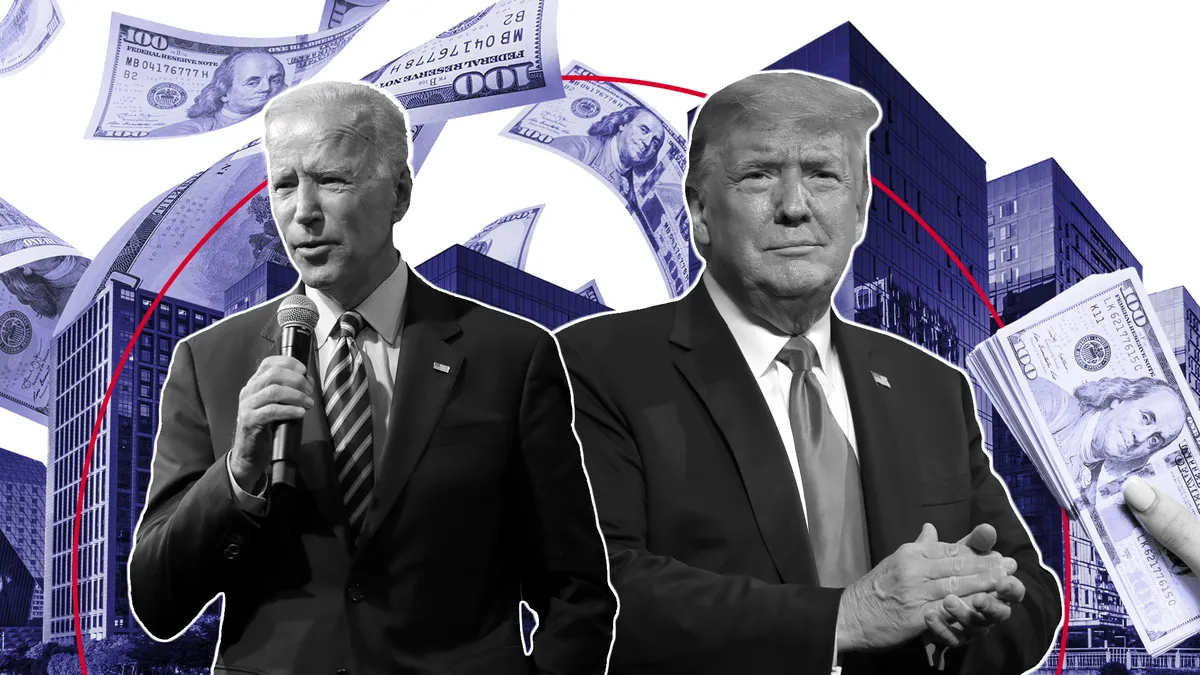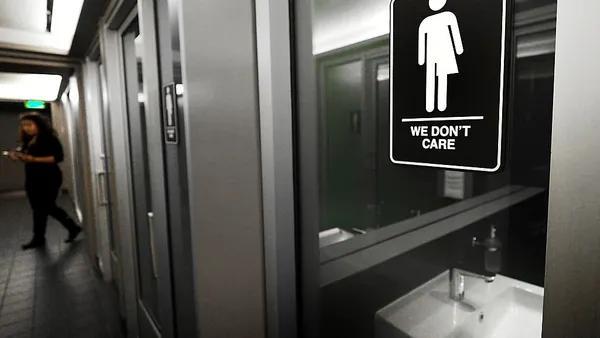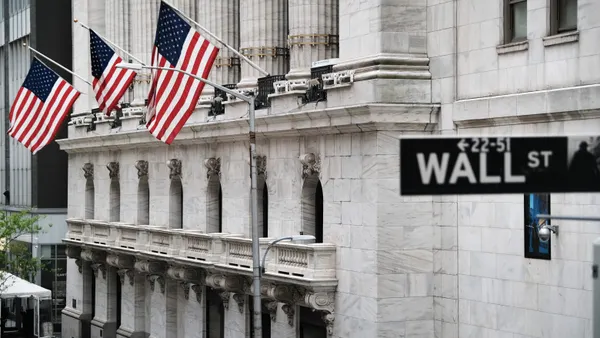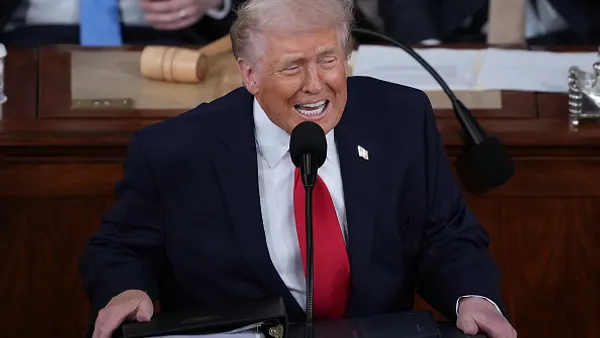As the 2020 presidential race continues, the platforms of President Donald Trump and former Vice President Joe Biden include policies that affect U.S. employers. HR Dive is providing an ongoing comparison of the nominees' platforms on topics such as employee compensation and benefits. Our intent is to prepare HR leaders and practitioners for any necessary updates or changes to workplace policies and procedures.
Federal minimum wage
President Donald Trump
During the final presidential debate Oct. 22, Trump did not confirm that he would support a $15 federal minimum wage. In a second administration, he would "consider" raising federal minimum wage "to an extent" but "not to a level where it's going to put all of these businesses out of business," Trump said. "It should be a state option," he said.
In June 2019, Trump said in an interview with Telemundo he would consider a federal minimum wage higher than $15 per hour. The bipartisan Raise the Wage Act, which would increase the federal minimum wage from $7.25 to $15 by 2025, was passed in the House July 18, 2019, but was not approved in the Senate. Trump said on July 1, 2020, he would have a statement on the minimum wage in the next two weeks, Reuters reported, but a formal announcement has not been made.
Former Vice President Joe Biden
Biden backs a $15 federal minimum wage and an end to the tipped minimum wage. The Democratic nominee also said he supports an end to the subminimum wage for workers with disabilities and aims to "ensure everyone has strong benefits." Biden's labor policy platform also said he plans to hold employers accountable for wage theft, union busting and proper worker classification.
Paid leave
President Donald Trump
Trump's fiscal year 2019 budget proposal included a paid family leave program that would have given new parents six weeks of leave through the unemployment insurance system. He also touched on the topic during his 2019 State of the Union address, touting a nationwide paid family leave program "so that every new parent has the chance to bond with their newborn child." He also signed into law a provision granting emergency paid leave during the novel coronavirus pandemic; that mandate sunsets at the end of 2020.
Former Vice President Joe Biden
Biden's website calls for "legislation that will provide 12 weeks of paid leave for all workers for their own or a family member's serious health condition."
Federal diversity training
President Donald Trump
Under Trump's directive, federal agencies have been instructed to end anti-racism or anti-bias training sessions that encourage "government workers to believe divisive, anti-American propaganda," according to a two-page Sept. 4 memo written by White House Office of Management and Budget Director Russell Vought. Trump expanded the mandate in a Sept. 22 Executive Order by including federal contractors and grant recipients among the groups barred from offering this kind of training. At the Sept. 29 presidential debate, Trump said the training represents "a radical revolution that was taking place in our military, in our schools, all over the place."
Former Vice President Joe Biden
During the Sept. 29 debate, Biden supported training on racial insensitivity. "People have to be made aware of what other people feel like, what insults them, what is demeaning to them," he said. "It's important people know. Many people don't want to hurt other people's feelings, but it makes a big difference. It makes a gigantic difference in the way a child is able to grow up and have a sense of self-esteem."
Affordable Care Act (ACA)
President Donald Trump
"Replacing Obamacare will force insurance companies to compete for their customers with lower costs and higher-quality service," The White House stated on its website. The president "is using his executive authority to reduce barriers to more affordable options for Americans and U.S. businesses." The Trump administration supports a case currently before the Supreme Court which seeks to overturn the ACA, a 2010 law.
Former Vice President Joe Biden
Biden supports the policy created during President Barack Obama's administration, when Biden served as vice president.
Immigration
President Donald Trump
The Trump administration's stance on immigration is perhaps best summarized by the "America First" ethos which seeks to promote American workers and businesses. Since taking over, through the actions of the U.S. Department of Labor, U.S. Customs and Immigration Services and the U.S. Department of Homeland Security, the administration has emphasized halting illegal immigration and slowing legal immigration, achieving the latter in part by increasing regulations and costs for employers and prospective immigrants.
The H-1B program, in particular, has been a target for reduction and other visa programs have seen changes leading to decreased applications or use. Industries such as agriculture and hospitality are particularly reliant on seasonal temporary work visas.
USCIS also has increased spending as the administration enacted policies to limit asylum and refugees at the border and deport undocumented immigrants. The administration also sought to end the Deferred Action for Childhood Arrivals program.
Former Vice President Joe Biden
The Biden platform for immigration vows to "take urgent action" to undo or reverse many of Trump's actions, highlighting restoration of asylum, eliminating policies such as the "Muslim ban" and reforming temporary visa programs. He has cited immigration's role in the economy and its value to U.S. employers.
"Trump has waged an unrelenting assault on our values and our history as a nation of immigrants," his platform said. "It's wrong, and it stops when Joe Biden is elected president."
"Integrating the talents of new immigrants into our communities and helping them to thrive enriches our nation and our economy," it later added
Job creation
President Donald Trump
Vice President Mike Pence in a recent debate said the administration has, since the start of the pandemic, added back 11.6 million jobs — about half those lost — "because we have a president who cut taxes, rolled back regulation and fought for free and fair trade." The administration also saved 50 million jobs with the Payroll Protection Program (PPP), he said; "We literally have spared no expense." The PPP estimate, however, has been called into question.
Former Vice President Joe Biden
Sen. Kamala Harris, during the vice presidential debate, noted that Biden plans to create clean energy jobs as part of his climate plan. Biden's plan also says he will "build a strong industrial base and small-business-led supply chains to retain and create millions of good-paying union jobs in manufacturing and technology."














